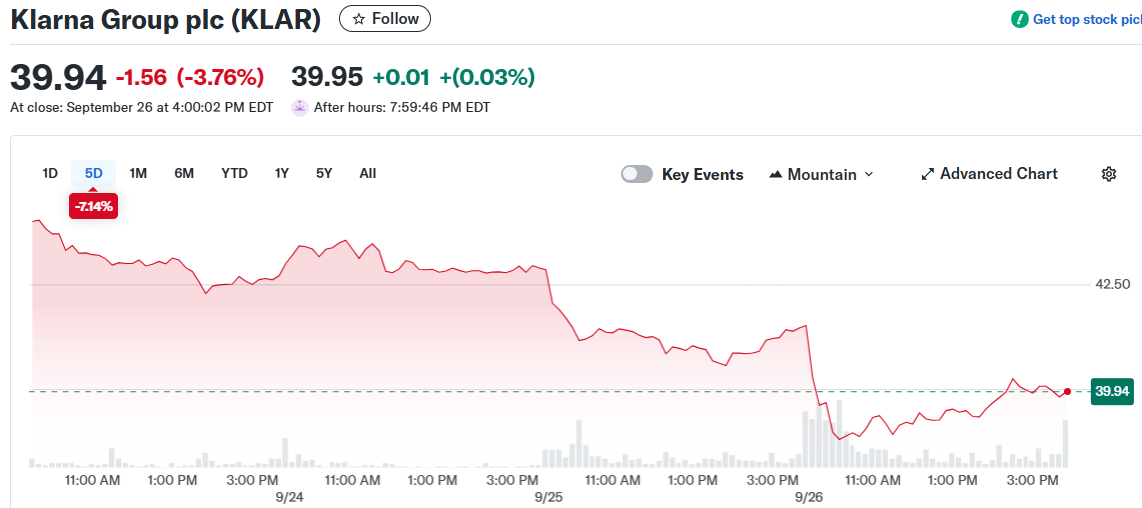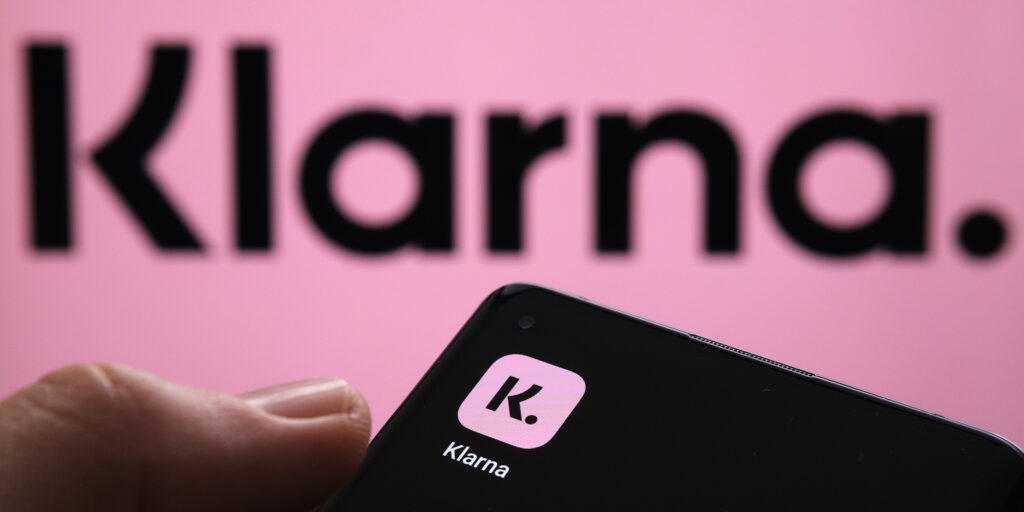TLDR
- Klarna (KLAR) stock dropped below its $40 IPO price for the first time on Friday, hitting a low of $38.31
- The decline comes during a broader fintech selloff, with Affirm (AFRM) and Block (XYZ) also trading lower
- Fed Chair Powell’s comments about “challenging situation” and “fairly highly valued” equity prices triggered the tech stock weakness
- Klarna’s stock has fallen nearly 15% from its debut closing price while the S&P 500 has gained 1.3% over the same period
- Over 1 million Americans signed up for Klarna’s new card in 11 weeks since its July launch
Klarna Group Plc. shares broke below their initial public offering price of $40 for the first time on Friday. The buy now, pay later company’s stock hit a low of $38.31 during trading.

The shares recovered slightly to around $39.37 by midday. This marks a sharp reversal from the company’s debut day performance when shares peaked near $57.
Klarna raised $1.37 billion through its September 10 IPO. The stock opened at approximately $52 on its first trading day and closed at $45.82, representing a 15% gain over the offering price.
The recent decline puts Klarna’s stock down nearly 15% from its debut closing price. This contrasts with the broader S&P 500 Index, which has risen about 1.3% over the same timeframe.
Fintech Sector Under Pressure
The drop comes as other fintech companies also faced selling pressure on Friday. Affirm Holdings shares fell as much as 2.5% during the session.
Block Inc., the payments company backed by Jack Dorsey, declined around 1.3%. The broader fintech weakness reflects investor concerns about the sector’s sensitivity to interest rates.
“Fintech stocks, including Klarna, are sensitive to macroeconomic factors like interest rates and regulatory developments,” said Diksha Gera, a Bloomberg Intelligence analyst. Higher yields can increase borrowing costs for these companies.
The Federal Reserve started cutting rates in 2025. However, any hints of slower-than-expected cuts could pressure valuations in the sector.
Powell Comments Spark Tech Selloff
Klarna’s stock began its downtrend on Tuesday following comments from Federal Reserve Chair Jerome Powell. Powell described a “challenging situation” facing the central bank as it balances its dual mandate.
“Two-sided risks mean that there is no risk-free path,” Powell stated during his remarks. He also noted that equity prices were “fairly highly valued.”
The comments helped trigger a broader technology stock selloff this week. The decline followed a record-setting rally that had driven tech stocks higher after the Fed’s first rate cut announcement.
Recent economic data suggested the Fed might not make further interest rate cuts as quickly as markets had anticipated. This shift in expectations contributed to the weakness across technology and fintech stocks.
The Fintech IPO Index declined 3.5% this past week according to recent data. This erased some of the sector’s recent gains as investor sentiment cooled.
Retail Sentiment Turns Bearish
On Stocktwits, retail sentiment around Klarna moved into bearish territory. Block also saw bearish sentiment from retail investors on the platform.
Affirm’s retail sentiment improved to neutral from bearish over the past day. This suggests some differentiation in how investors view various fintech names.
Circle’s shares dropped 11.2% during the week. DeFi Development lost 15.7% while Flywire gave up 1.9%.
Sezzle shares declined 5.9% and nCino’s stock fell 7.8%. The broad-based selling affected most names in the fintech space.
A cryptocurrency rout also occurred this week, wiping out more than $140 million in market value. Ether dropped 4.7% to its lowest point in almost seven weeks.
Bitcoin fell 1.7% as institutional inflows cooled. Technical signals pointed to short-term pressure according to crypto analysts.
Recent Business Updates
Despite the stock price decline, Klarna reported strong user adoption for its new product. More than 1 million Americans signed up for the Klarna Card in the 11 weeks since its July 4 U.S. launch.
The card allows users to choose between debit or pay later payment modes. This represents a key expansion of Klarna’s services in the American market.








